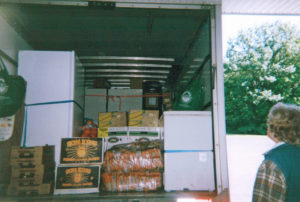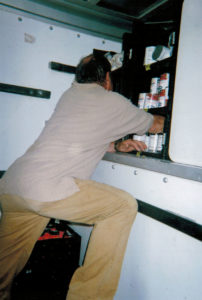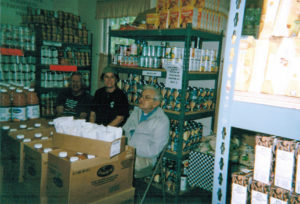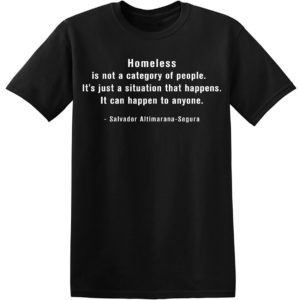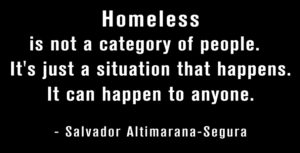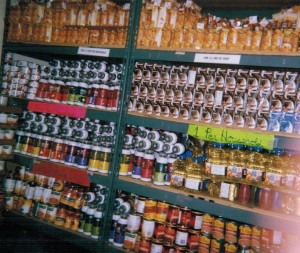What I Believe – Seniors in a Food Pantry
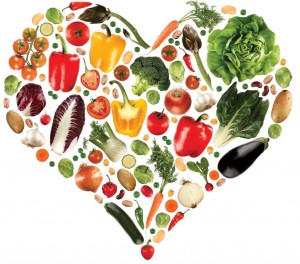
As seniors age, the courage we experience becomes more obvious as we feed hungry people. After all, what does a senior have to lose? Courage is a necessary part of the aging personality because our platform continually shrinks.
We’re often overlooked in the homeless arena. Those looking out forhomeless people focus on an older adolescent (especially if there’s an infant involved), and families. There’s just not much energy left over for hungry people seniors and cocker spaniels.
It never occurred to me that turning away hungry people in the pantry line was something I would do. Or could do. Or even consider doing. Turning away hungry people was not an option.
I came to the pantry as a crone or harridan depending on the circumstances and a person’s attitude toward me and my attitude toward hunger. I brought already formed opinions and beliefs, many of which were with me at birth.
Some argue that people are born as blank slates. I can’t agree. For one thing, I never experienced a blank slate when it came to hungry people. I didn’t have an “aha” moment when I met my first hungry person. I didn’t examine the value of feeding hungry people in a philosophy or government class. I never, at any time, analyzed the concept of feeding the hungry.
Because I lived my opinions about hunger, and because I got up close and personal with hungry people in Mexico and Venezuela, I was comfortable with the concept of feeding hungry people.
I never even considered not feeding hungry people I the food pantry. When I saw them, I remembered moments in Mexico and Venezuela and realized hunger is an intensely personal situation accompanying malnourishment. Hunger can lead to starvation.
Hungry people needing food are voiceless. Even though it’s harder on those with mental and emotional issues, it impacts everyone spiritually.
As they distribute pantry food, volunteers reduce costs in other areas of government: healthcare, housing, education.
A long-term poor diet contributes to illness which poor people can’t afford. Healthcare costs get shuffled over to taxpayers. When forced to choose between housing and food, the hungry often opt for housing. Later, if they can’t pay the housing costs and end up homeless. This results in further tax bills.
When school children are too hungry to learn, the damage is long term. They risk becoming uneducated adults unable to qualify for employment. Our problems flow to the next generation and the future.
DANA
“Hi, Dana. Come on in and shop. How’re you doing this week?”
“Fred’s still in the hospital. He’s been diagnosed with kidney disease and he’ll be on a special diet when he comes home.”
“I’m sorry to hear that.”
“I’m so glad you sent me to Dr. Longmore. He told me exactly who to go see, what paperwork to get, everything I needed to get care for him. I hope Fred’s coming home soon.”
“Dana, I’m so happy to hear this.”
“Thank God the pantry has all these fresh fruits and vegetables. By the way, do you have any laundry soap today?”
“I wish!”
I met Dana the first morning I worked in the pantry and she shared her adventures with me every week from that pantry day on. Of all the people going through the line in the pantry, I probably learned more about her than anyone else.
I never learned where she lived, how many children she had, where she came from or anything like that. What I learned from her was a running commentary of present tense food insecurity. She shared her daily struggle as she traveled through life trying to keep a roof over her head, clothes on her back, and food in her refrigerator.
Walking through the line weekly, she shared her life with me. I learned how she found a coat for the winter when the old one wore out and she had no money.
“Dana, your coat is beautiful!” It’s going to keep you so warm!”
“Yes, it is, isn’t it? You should have seen it when I found it. It was filthy!” I couldn’t even tell what color it was. I took it home, put it in the tub and worked on it all afternoon ’til I cleaned it up. Now look at it. It’s a perfect fit!”
I learned how she struggled to keep her car going…and then finally gave it up.
“The bus is working out real well over here. I catch it about two blocks from my apartment in Saugerties and ride it over. I wait in the hall ’til it comes back to take me home. I only have to carry my groceries about five blocks in all! I’m so lucky I found this bus. I get to ride free because I’m a senior!”
Dana was the most confirmed optimist shopper in the line. And, when Dana was in the line, I was the most confirmed optimist pantry volunteer in the place.

Thank you for reading this article! Please refer it to your preferred social media network.
Thurman Greco
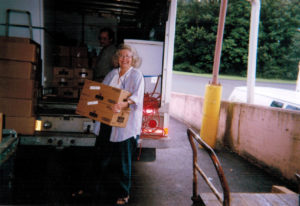

New Beginnings – Part 2 as I Explore the Spirituality of Hunger in America

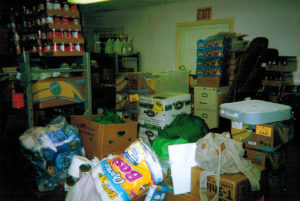
Like many first-time pantry volunteers everywhere, I showed up that morning because someone from the church asked me to come. A slot needed to be filled and I stepped up to the plate when I was asked. I was a foot soldier in the army of the outreach. I tried to live up to my status in the church as a new member. I showed up at whatever activity needed help and did my share. Nothing more.
I had no desire to move up any ladder in the congregation.
On that morning of new beginnings, I had no premonition I would ever return to this pantry room.
I had no plans for this place in my future. I had a profession teaching reflexology, Reiki, and canine massage therapy in a healing space in my home on Tannery Brook.
This was a case of fools rushing. Knowing what I know now, I should have run out the door and never looked back. Mary could have handled the crowd that day without me. In the whole two hours, no more than a couple dozen people visited the pantry.
I wasn’t blessed with any psychic knowledge…certainly not the feeling of danger I felt when I saw the head of the building committee in the hallway outside the pantry months later.
There were no lines in the hallway at the new beginnings of my time there. People wandered into the pantry in groups of one and two to choose from cereal, soup, tuna, and peanut butter.
Never in my wildest thoughts on that day did I envision the pantry hallway filled with hungry people, the tiny room packed with fresh produce and jammed with shoppers.
By 2008, the tanked economy was well underway and waits in the hallway were an hour or more.
The Hunger Prevention Nutrition Assistance Program (HPNAP) passed down feeding guidelines which included whole-grain bread, 1% milk, fresh produce. By 2011, the building committee had rules dictating where people could stand, what bathroom they could use, and what parts of the hallway were off-bounds.
Never did I foresee monthly food deliveries averaging over 12,000 pounds.
Never did I imagine, on that day, building committee members angry over hungry people receiving food according to guidelines set down by the State of New York, the Department of Health, and the United States Department of Agriculture.
I never thought I would spend months grappling with the unworthy hungry, a concept introduced to me by a local religious leader. The concept wasn’t explained. Only the two words – unworthy hungry – were used in a sentence: “You are feeding the unworthy hungry.” This was something I never heard of before. What did she mean? Who were the unworthy hungry?
After that first morning in the food pantry, I drove home, pulled out a little notebook from a drawer and wrote what people said, like real writers do. When I wrote these things down, I felt my grandmother’s presence.
Her spirit was with me in the room. I looked around the dining area to see if someone had entered the room without my realizing it. But, no, I didn’t find a soul. I walked over to a cabinet and began my dialogue journal on that afternoon.
A shopper: “They cut my food stamps again. I don’t know how I’m going to make it. I have no money this month. My car died and I don’t know where I’m going to get money to fix it. If I can’t fix it, I can’t buy a new one either.”
Lillie Dale Cox Thurman spoke to me clearly that morning with emphatic, strong, direct instructions. She went straight to my head: “Write this down! Write this down too! Now…write this down.”
My grandmother, Lillie Dale Cox Thurman, stepped into my life on the first morning in the food pantry and never left. Not even when my mother, Uralee Thurman Lawrence, roared in with prayers and fast, furious, aggressive instructions which I resisted to the bitter end. Under their directions, I joined the crowd in the basement and was soon volunteering regularly.
So, now, I’ve got the second volume, “The Ketchup Sandwich Chronicles,” coming out on this blog.
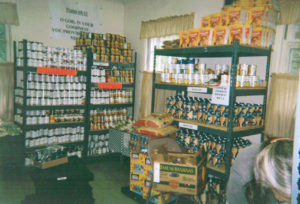
Thank you for reading this blogged book! Please refer it to your preferred social media network and stay tuned for future chapters!
Thurman Greco

The Hunger Book is on the Editor’s Desk!
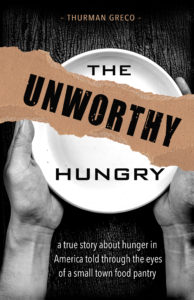
After what seems like eons, this hunger book is finally on the editor’s desk.
This book is long, complicated, and full of information focusing on a subject people know very little about – unless they live and/or work in it. Recently, on the advice of my editor, the book has been divided into three separate books.
Because of these changes, the hunger book will be easier to read and use.
With three volumes, we now have three titles:
“I Don’t Hang Out in Churches Anymore”
“The Unworthy Hungry”
“Hungry in America”
Of course, as a book progresses, things change and then they change again. So, whether it’ll have two sections or three, it’s true that the one volume was way too large.
I’m extremely excited about this project! Our goal for this project is to send the first volume to the publisher by mid-September.
Thank you for reading this blog. Please refer this article to your favorite social media network.
“A Healer’s Handbook” is now available! You can purchase it through Amazon, Barnes and Noble, and my website: http://www.thurmangreco.com.
Thanks!
Thurman Greco
